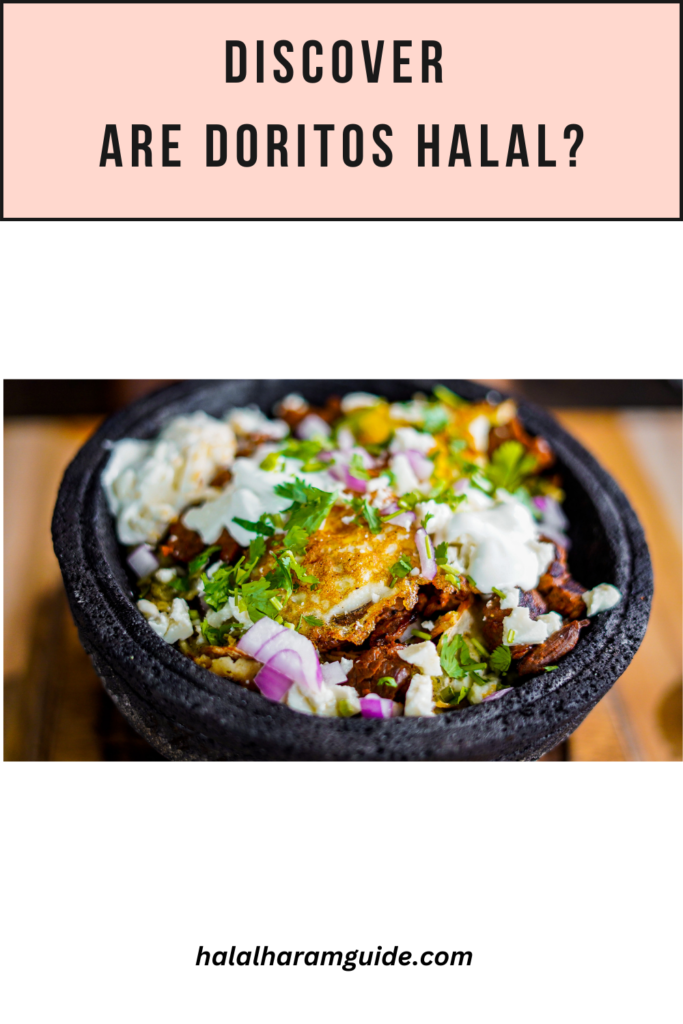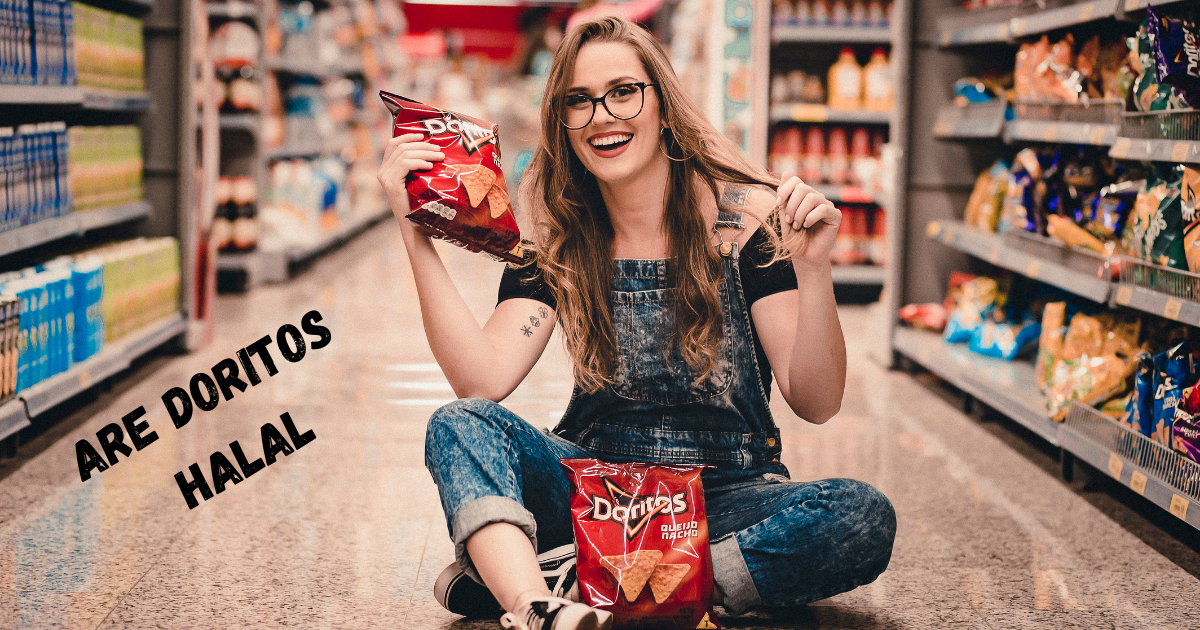If you’re someone who enjoys snacking, then you’ve probably tasted the crispy and flavorful goodness of Doritos at least once in your life. However, if you follow a halal diet, you might find yourself wondering, ” Are Doritos Halal ?” It’s essential to know whether these beloved snacks align with your dietary requirements.
In this blog post, we will explore and clarify the halal status of Doritos, ensuring you can make informed choices about the foods you consume. Let’s delve into the details and uncover the truth about the halal certification of Doritos chips!
What Are Doritos?
Doritos are a popular brand of tortilla chips that are widely recognized for their bold and intense flavors. These triangular-shaped corn chips are known for their crispy texture and come in various flavors, catering to diverse taste preferences.
Originally created by Arch West and released by Frito-Lay in 1964, Doritos have since become a global snacking phenomenon, enjoyed by people of all ages. With their distinctive crunch and wide range of flavors, Doritos have become a go-to snack for many, whether as a party favorite, movie companion, or a quick bite to satisfy hunger cravings.
Are Doritos Halal?
Doritos products did not have a universally consistent halal certification. The halal status of Doritos may vary depending on the region and the specific manufacturing practices employed by the company.
What Are The Ingredients Of Doritos?
The ingredients of Doritos may vary depending on the specific flavor and type of product. However, here are the common ingredients found in traditional Doritos
- Corn (Ground Corn, Cornmeal)
- Vegetable Oil (Sunflower, Corn, and/or Canola Oil)
- Salt
- Cheddar Cheese (Milk, Cheese Cultures, Salt, Enzymes)
- Whey
- Maltodextrin (made from corn)
- Monosodium Glutamate (MSG)
- Buttermilk
- Romano Cheese (Part-Skim Cow’s Milk, Cheese Cultures, Salt, Enzymes)
- Whey Protein Concentrate
- Onion Powder
- Corn Flour
- Natural and Artificial Flavorings
- Dextrose
- Tomato Powder
- Lactose
- Spices
- Artificial Colorings (Yellow 6, Yellow 5, Red 40)
- Lactic Acid
- Citric Acid
- Sugar
- Garlic Powder
- Skim Milk
- Red and Green Bell Pepper Powder
- Disodium Inosinate
- Disodium Guanylate
Is Doritos Made With Pork?
The traditional Doritos flavors do not contain pork as a direct ingredient in their formulation. The primary ingredients of Doritos typically include corn, vegetable oils, flavorings, and seasonings. Pork is not listed as a typical ingredient in the standard flavors of Doritos.
Which Flavors of Doritos Do Not Contain Pork?
Most traditional Doritos flavors do not contain pork as a direct ingredient. The standard flavors of Doritos, such as Nacho Cheese, Cool Ranch, Spicy Sweet Chili, and Salsa Verde, do not include pork in their ingredients.
What Makes Doritos Questionable?
Doritos can be considered questionable for certain individuals or groups for various reasons:
- Pork or Non-Halal Ingredients: For people who follow halal dietary restrictions (Islamic dietary laws), certain flavors of Doritos may be questionable if they contain pork-derived ingredients or ingredients not certified as halal.
- Kosher Considerations: Some flavors of Doritos may not be certified as kosher, making them questionable for those who adhere to kosher dietary laws.
- Allergens: Doritos and other snack foods can contain common allergens like wheat, soy, milk, and various artificial additives. Individuals with allergies need to check the ingredient list carefully.
- Artificial Additives: Some individuals prefer to avoid foods with artificial colors, flavors, and preservatives, which can be present in Doritos and other processed snacks.
- High Sodium and Fat Content: Doritos are known for their bold flavors, but they can also be high in sodium and fat, making them a less healthy snack option.
- Cross-Contamination: For people with severe allergies to specific ingredients, there might be concerns about cross-contamination during the manufacturing process.
Non-halal Doritos Chips
Some Doritos flavors may be considered haram (not permissible for Muslims to consume) due to the presence of certain ingredients that are not allowed in Islamic dietary guidelines. These ingredients may include:
- Pork and Pork-Derived Ingredients: Any flavor that contains pork or pork-derived ingredients would be considered haram, as the consumption of pork is strictly prohibited in Islam.
- Alcohol-Derived Additives: Flavors that contain alcohol-derived additives, such as certain artificial flavors or preservatives, would also be considered haram, as alcohol consumption is not allowed in Islamic dietary practices.
- Non-Halal Certified Ingredients: Some Doritos flavors may use certain ingredients that are not halal-certified or have undergone processing that may not align with Islamic dietary guidelines, making those flavors haram for Muslims to consume.
Can Muslims Eat Doritos?
Whether Muslims can eat Doritos depends on their individual dietary preferences and practices. Some Doritos flavors are certified as halal, meaning they meet the dietary requirements of Islamic law and are permissible for Muslims to consume. These halal-certified Doritos do not contain pork or pork-derived ingredients and do not involve the use of forbidden substances.
On the other hand, some Doritos flavors may not be certified as halal, and they might contain ingredients that are not permissible for Muslims to consume, such as pork or alcohol-derived additives. It is essential for Muslims who adhere to halal dietary guidelines to check the product’s packaging for halal certification labels or inquire about the halal status of specific Doritos flavors.
Ultimately, whether Muslims can eat Doritos depends on the specific flavor and its certification status. It is recommended that Muslims verify the Halal status of any food product, including Doritos, to ensure that it aligns with their religious dietary requirements. If in doubt, they can consult with Halal certifying authorities or contact the manufacturer directly for clarification.
Why is there a controversy over Doritos being halal?
The controversy over Doritos being halal arises due to several factors:
- Lack of Clarity: Some Doritos flavors may not have clear halal certification labels or information on their packaging, leading to confusion among consumers about whether they are halal or not.
- Regional Differences: Halal certification can vary by country or region, and what is considered halal in one place may not be accepted as halal in another. This discrepancy can lead to debates and controversies over the halal status of specific Doritos flavors.
- Ingredients and Production Practices: The presence of certain ingredients or production practices that may not align with Islamic dietary guidelines can raise concerns among Muslims about the halal status of Doritos chips.
- Cross-Contamination: In some cases, cross-contamination during the manufacturing process can occur, potentially compromising the halal status of a product. This can be a concern for individuals with strict dietary restrictions.
- Religious Sensitivities: Halal certification is an important consideration for many Muslims who adhere to religious dietary restrictions. Any uncertainty or lack of clarity regarding halal certification can lead to controversies and discussions within the Muslim community.
- Cultural Sensitivity: In some regions, food plays an essential role in cultural and religious practices. Disputes over halal certification can reflect broader cultural sensitivities and preferences.
Conclusion
In conclusion, the halal status of Doritos is a topic of significant interest and concern for many individuals, especially those adhering to Islamic dietary guidelines.
While some flavors of Doritos have been reported to be halal-certified in certain regions, others may not meet the requirements due to the presence of non-halal ingredients or lack of halal certification.
As consumers, it is essential to be vigilant and informed about the specific flavors we choose to ensure they align with our dietary preferences and religious beliefs.
Checking for halal certification labels on the product’s packaging and consulting with certified authorities can help us make conscious and responsible choices. Ultimately, by staying aware and making informed decisions, we can enjoy our favorite snacks while remaining true to our individual dietary practices.
FAQS
FAQS about Are Doritos Halal?
Is Doritos halal or harām?
The halal status of Doritos varies by flavor and region. Some flavors may be halal (permissible for Muslims to consume), while others may contain non-halal ingredients, making them haram (impermissible). It is essential to check the product’s packaging for halal certification labels or consult with local Halal certifying authorities for clarification.
Why are Doritos not halal?
Doritos may not be halal due to the presence of non-halal ingredients such as pork or alcohol-derived additives, and lack of halal certification in some flavors. Muslims should verify halal status through labeling or certifying authorities.
Is Doritos Cheetos halal?
Some Doritos and Cheetos flavors may be halal, while others may not be halal due to the presence of non-halal ingredients or lack of halal certification.
Is Doritos halal in UAE?
Some flavors of Doritos were reported to be certified as halal in certain regions, including the UAE (United Arab Emirates). However, the halal status of specific Doritos flavors can change over time, and new certifications may be obtained or discontinued.
Do Doritos have pig fat?
The standard Doritos flavors did not contain pig fat as a direct ingredient. The primary ingredients of Doritos typically include corn, vegetable oils, flavorings, and seasonings
- “Is Lobster Halal? Understanding Its Permissibility”
- “Is Drawing Haram in Islam? Understanding the Perspective”
- “Is Fermented Kimchi Halal? Exploring Kimchi’s Halal Status”
- “Is Collagen Halal? Unveiling the Halal Status of Collagen”
- “Is Wine Vinegar Halal? Unveiling Its Permissibility”


